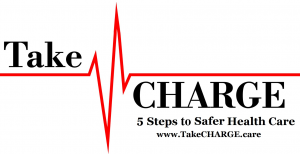Media Release: TakeCHARGE Campaign Launches Step 1 - Understand and Complete Your Advance Directives
First phase of 5-month public awareness action campaign.
If you are 18 or over, you need to be prepared with your own decisions.”
ROSLYN, NY, US, April 18, 2022 /EINPresswire.com/ -- It’s now more than two years since the COVID-19 pandemic began to change our world. In March, 2022, the US passed the grim milestone of 1 million deaths from the disease. Although case rates are much lower now, our hospitals are still treating patients on respirators. They can't speak. Some are dying. — Ilene Corina, BCPA
Those who have prepared by naming a health care proxy or surrogate, or making a "living will" know that their wishes about their care will be respected. Those who haven't prepared? Well, their treatment decisions are entirely up to others.
So, in April 2021, the TakeCHARGE Campaign starts its 2022 season focused on #1 of its “5 Steps to Safer Health Care”: Understand and Complete Your Advance Directives.
What are “advance directives”? This is a catch-all term for several kinds of documents you can complete that define and protect your wishes about treatment, if you are unable to communicate. Some, like the “healthcare proxy” designate someone to make decisions on your behalf; others, such as a “living will”, specify your wishes when it comes to, for example, life-support, or organ donation.
Why does this matter? Take the example of Pat S., a 34-year-old father of two, who struggled with COVID-19 at home, but in the end found himself in the intensive care unit on a ventilator. Knowing that he was young and healthy, he had not prepared any advance directives, so here he was, unable to communicate about potentially life-and-death decisions.
In a Time of Crisis
Long-time patient advocate Ilene Corina, president of Pulse Center for Patient Safety, Education & Advocacy which launched TakeCHARGE in 2020 says, "In today's crisis more than ever, we should ask ourselves:
• Breathing machines — would I want to be put on one and under what circumstances?
• Do I want to be free of all pain and get pain medication?
• Do I want to be part of medical research?
• Does my religion permit blood transfusions?
• What about organ or tissue donation?
• Finally, who will speak for me if I can't share this information with the medical team?”
"If you are 18 or over," she adds, "you need to be prepared with your own decisions."
You can learn more about the TakeCHARGE Step 1 here (https://takecharge.care/step-1/). Also look for TakeCHARGE messages on Facebook, Twitter, Instagram and LinkedIn
For interviews or more information, please call (516) 579-4711.
Ilene Corina
Pulse Center for Patient Safety, Education & Advocacy
+1 516-579-4711
email us here
Visit us on social media:
Facebook
Twitter
LinkedIn
Other
Legal Disclaimer:
EIN Presswire provides this news content "as is" without warranty of any kind. We do not accept any responsibility or liability for the accuracy, content, images, videos, licenses, completeness, legality, or reliability of the information contained in this article. If you have any complaints or copyright issues related to this article, kindly contact the author above.


